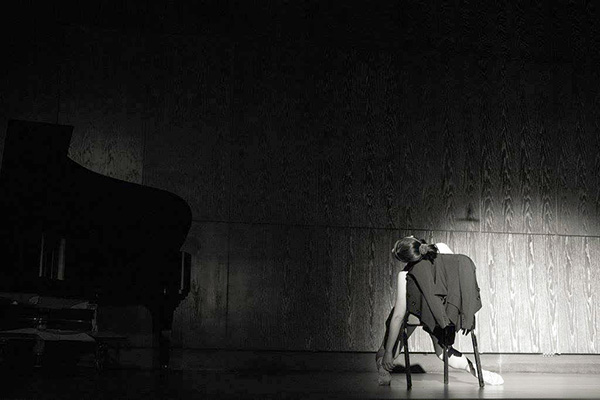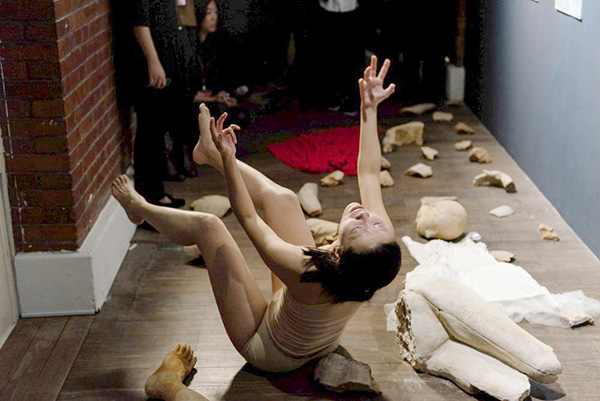The Attitude of Being a Professional
DELPHINE HSINI MEI is an interdisciplinary artist and performer based in Taipei, Taiwan. She shares her frustration with commonly held assumptions about dancers, and stresses the subjectivity of pursuing an artistic endeavor. Her responses are part of a larger series dissecting what it means to be a professional dancer. To read other perspectives on the topic, click here.
~~
What does your current regular dance practice look like?
I keep a daily morning practice routine, which includes a combination of yoga, breathing exercises, stretching and strengthening. This also depends on my performance schedule; at least two months minimum before a performance, I start a more intensive morning practice routine, which means longer time, more specific poses, and added postures and trainings, coupled with evening work exploring music and costume ideas.
Would you call yourself a professional dancer?
Yes.
What do you believe is necessary for a dancer to call themselves professional? Is part of being a professional getting paid?
I think it is being professionally trained and practiced. Being paid is part of it, but not necessarily the first criteria. A dancer who has trained and practiced isn’t necessarily professional either; it is an attitude as well – how you respect the profession and the people involved in the work, etc.
Is there a certain amount of training involved in becoming a professional dancer?
Yes, for sure. These days all around the world there is this instant culture going on. Everything is instant: instantly famous, instantly becoming something. However, I have personally believed since a young age in a solid and lengthy training process. Like a martial art or kung-fu, you can learn and remember the steps quickly, but you need various experiences to be able to learn about your opponents/partners, and most importantly, yourself. Once a dancer knows their self deeply, allowing and embracing all facets of oneself, it shifts their performance from just a nice form/shape into something completely different, the embodiment of beauty outside and inside. And I think only time can do that.
Do you consider project-based work to be professional?
Yes. I think it all depends on quality of project, rather than quantity. Although consistently producing work and working with concepts are important, sometimes one needs to live in order to dance, and I don’t mean making money. I mean fully indulging into other aspects of life, to dance with life so to speak, and then bring that experience onstage.
A good project is better than 10 lousy rushed ones. After all, first and foremost you must dance for yourself, right?
Do you consider solo work to be professional?
Yes, I just did a solo work last year and was invited to perform it in a dance festival of professional work.
Do you think the definition of a professional dancer is different than it was 25 or 50 years ago? If so, do you have any ideas why it might have changed?
Yes. As times change, it is the nature of definitions to change, even the definition of “dancer.” Out of many factors, I think the advancement of technology and its changing relationship to our bodies, both the perception of body and how our bodies might feel, has shifted.
Are there instances when people apply the term “professional” to a dancer or group of dancers when you feel it shouldn’t be applied?
Yes, but the term is applied so widely I think everyone has his/her own measures. Artistic measures are always subjective, I think.
How might your cultural perspective – where you live, where you’re from, what form of dance you practice – influence what you think of as professional?
Here in Taiwan, the dance profession is similar to how it is defined in the western world in general. Getting paid and regular gigs, recognition from institutions such as government, awards and degrees, a.k.a. fame and fortune, are how people measure whether you are a professional or not.
What do you wish people wouldn’t assume about the dance profession?
Oh, there are so many things!
To give one or two: If you are a dancer, people immediately assume you are always on a diet or keep a very rigid eating style to keep fit. Although one must stay fit to dance, and dance itself makes you fit, it by no means indicates that a dancer is always on some kind of starvation diet (some might do this, many others don’t!).
Another assumption is that a lot of people think dancers are only pretty things, just physically amazing and not interested in anything else than spinning ourselves around. I personally have had the pleasure of meeting so many interesting, and yes beautiful, dancers and having great inspiring conversations. I think among the many artistic professions, dance is sometimes seen as less serious than other artistic genres. People often forget it needs a lot of dedications and hard work to make a profession out of it.
~~
Born in Taiwan, Delphine Hsini Mei has practiced dance in the US, Europe and Asia. She studied dance at the Taipei National University of the Arts, received a BFA/BA in art history and arts from the University of Illinois, and received an advanced diploma in physical theatre and dance in Helsinki, Finland. She’s been a resident artist at Cite American-Foundation (Paris, France) and Dance Short (Amsterdam, NL). Her performance video works have been shown on ARTE CREATIVE Channel Europe and ARTOPIA Taiwan.
Watch videos of Delphine’s choreography and performances here.



2 Responses to “The Attitude of Being a Professional”
Hi Jane, Thanks for reading!
On Stance on Dance, I run series on certain topics relating to the dance field for a month or two, and try to get several voices to weigh in on that particular issue. The beginning of this year has been focused on professionalism. You can read some of the other topics that have been covered over the past six years here: https://stanceondance.com/about/.
Thanks so much again for reading!
Emmaly (editor)
I don’t understand why the only subject for interview is professionalism. Thanks
Comments are closed.